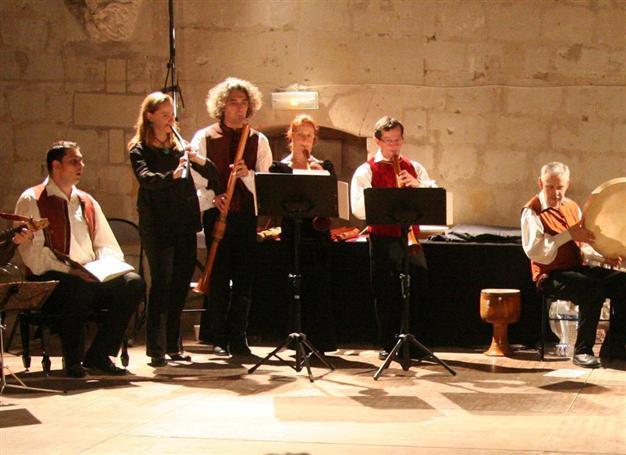Renaissance classics and Ottoman music to gather
ISTANBUL - Hürriyet Daily News

The Doulce Memoire Ensemble focuses on Renaissance music. The project ‘Gates of Felicity project is an attempt to merge classical Renaissance music with 15th and 16th century Ottoman music.
The Doulce Memoire Ensemble and Paris-based Turkish ney player Kudsi Ergüner have joined forces for a special stage project, which is to perform for an Istanbul audience on June 14 as part of the 40th Istanbul Music Festival, organized by the Istanbul Culture and Arts Foundation (İKSV).The project, titled “Bab-ı Saadet” (Gates of Felicity), is an attempt to merge classical Renaissance music with 15th and 16th century Ottoman music. In a sense, the start of the collaboration dates all the way back to the Ottoman conquest of Istanbul; a talk on that subject between the Doulce Memoire conductor, Denis Raisin Dadre, and Ergüner lit the first sparks of the project.
“The Doulce Memoire Ensemble is a renowned group of researcher/musicians focusing on Renaissance music. The concerts I have given all these years with my ensemble throughout Europe have received great interest from all artists that work on old music. I met Doulce Memoire’s conductor Denis Raisin Dadre years ago on a radio show. We were talking about the Renaissance and Istanbul’s conquest by the Ottomans. When he said ‘the fall of Constantinople,’ I interrupted to correct him and said ‘saving Istanbul from falling into your Latin hands.’ What we call a conquest is a fall for them, quite naturally.”
This original disagreement led the way to a beautiful collaboration in the following term and after that radio program Dadre and Ergün not only remained friends but also decided to make a project focusing on this particular opposition.
The project’s repertoire includes a performance of “Fortuna desperata,” “Jérémie’s laments,” Guillaume Dufay’s “A Lament on the Conquest of Constantinople,” as well as Avni’s “Fatih Sultan Mehmet,” Sultan Bayezid II’s “Neva Peşrev.”
Ergüner said that in preparation of the repertoire they prioritized a selection based on chronology and melody types (makam).
“In poetic content, we wanted to highlight a cultural opposition between Renaissance Europe and the 15th and 16th century Ottoman Empire. While the music in the former shows a tendency towards dance and entertainment, that in the latter sustains its loyalty to Sufistic love. In addition, we responded to the lamentation poems composed in the Christian world after Istanbul’s conquest with Sultan Mehmet the Conqueror’s poems, written under the pseudonym of ‘Avni.’”
The project was prepared at Fontevraud Abbey in France, where it was also premiered. It was also performed at the opening of the Montecarlo Festival and in the Metz Arsenal and Sully festivals.
The next shows will be at the France Festival and the Tour Festival in France, followed by three concerts at the Palais de Beaux Arts in Brussels, all coming this September, when the repertoire will also be released as an album.
The Kudsi Ergüner Ensemble’s history
The Kudsi Ergüner Ensemble was founded in 1979 with the objective of promoting Ottoman music and its living masters in international music circles. Since then, the ensemble has given concerts extensively around the world in collaboration with such eminent musicians as Bekir Sıtkı Sezgin, Necded Yaşar, Hüsnü Anıl, Cüneyd Orhon, İhsan Özgen, Abdi Coşkun, Alaeddin Yavaşça, Erol Deran, Yusuf Bilgin, Aziz Bahriyeli and Fevzi Mısır, performing Ottoman music and Sufi rituals. As of 1992, the ensemble has enjoyed the contribution of promising young musicians such as Derya Turkan, Hakan Güngör, Mehmet Bitmez, Yurdal Tokcan, Yunus Balcıoğlu, Murat Aydemir, Bora Uymaz, Alper Uzkur, Şükrü Kabacı, Hamdi Akatay and Bruno Caillat in over 1,000 concerts. The Erguner Ensemble, while unearthing the long-forgotten works of the past, continuously develops new projects and works in cooperation with renowned musicians, including Renaud Garcia Fons, Michel Godard, Bojan Z, Cristof Lauer, Markus Stockhausen, Mark Nauseef, Chriss Jenings, Patrice Herald, Ami Flammer, Yves Robert and Arild Andersen.
Who is Kudsi Ergüner?
Kudsi Ergüner is the only musician raised by one of the last representatives of the classical nay school, Ulvi Ergüner. He is internationally renowned for his performances and recordings of the Ottoman and Sufi music, which owe their universal position today mostly to him. His research on traditional music has not been limited to Turkey either, having spanned India, Pakistan, Afghanistan, Japan and North Africa. He has released over a hundred albums covering a variety of subjects, works or projects and his three books published in France were translated into various languages. The musicians with whom he has collaborated include Peter Brook, Carolyn Carlson, Maurice Béjart, Peter Gabriel, Robert Wilson, Georges Aperghis, Tony Gatliff, Didier Lockwood, Michel Portal, Marc Minkowski, Fazıl Say, Cristoph Lauer, and Michel Godard.
















